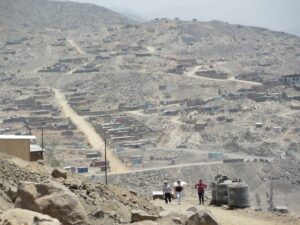
The celebration of Saint Joseph the Worker was instituted on 1 May 1955 by Pope Pius XII so that it would coincide with International Workers’ Day or May Day – a celebration of work and workers’ rights coming out the 19th Century industrial revolution. The Soviet Union had used this day to have massive military parades and exalt communism, so Pope Pius XII wanted to ensure that workers did not lose a Christian understanding of work.
As we reflect on the daily life of the Family of Nazareth, the Gospel specifies the work of Joseph – that of a carpenter. He was able to support his family with this trade and went on to teach Jesus the skills needed. We are reminded that after the episode in the temple, Jesus ‘went down with them and came to Nazareth and was obedient to them’. (Lk 2:51) This obedience would have implied sharing in the work of Joseph so that Jesus became known as the carpenter’s son (Matt 13:55) and a carpenter (Mark 6:3).

While in Peru, I knew Anthony the carpenter. He is the son of a solo Mum with four children, the youngest girl being severely disabled. When the children were little, the two boys went to an orphanage for several years as their Mum could not look after all four of them. They would come home periodically, but Mum was determined to have them home permanently. She learnt cooking skills through a program run in our parish, acquired a job, fulfilled her desire and brought the boys home. Anthony grew, learnt carpentry and was making wooden ladders which he sold to the local hardware stalls around our market when last I saw him. He was so proud to be bringing some income into the family.
I recently heard a young man speak who came as a refugee to Australia at the age of seven. He has completed his High School qualifications but cannot go on with further study or a job because of visa restrictions. Where is the dignity of work in this situation, what rights does this young man have?
The Church has long held the dignity of work and in Laborem Exercens, Pope John Paul II wrote “the Church considers it her task always to call attention to the dignity and rights of those who work, to condemn situations in which that dignity and those rights are violated and to help guide social changes…”
As we celebrate this feast day, we reflect on our own engagement in the dignity of work. We might ask ourselves: Do I have a work time/free time balance? Am I committed to my work? Do I collaborate on team initiatives? Do I mentor junior colleagues? Do I aim for excellence in work? Am I honest and transparent in work relationships? Am I committed to learn new skills that can enhance work performance? Am I aware of the many situations of those people who do not have dignified work? People who are exploited and trafficked, work long hours on low wages, or working in unsafe conditions?
St Joseph the Worker stands as a powerful figure who represents hard work, humility, and dedication. May we also uphold the dignity of work, contributing to building community wherever we find ourselves.
Clare Conaglen rsj
